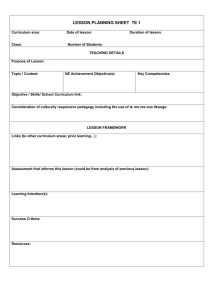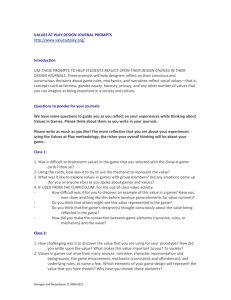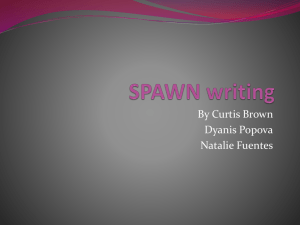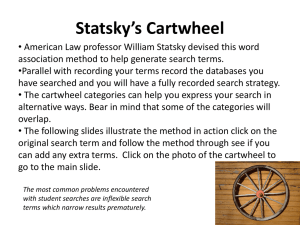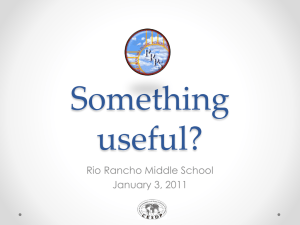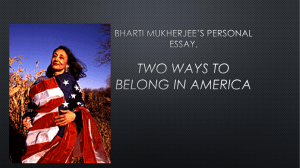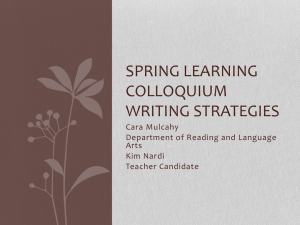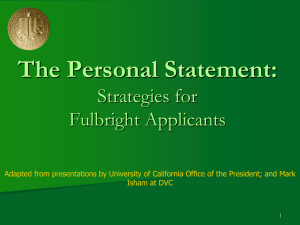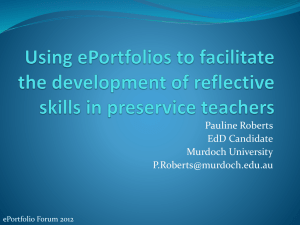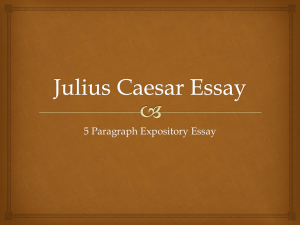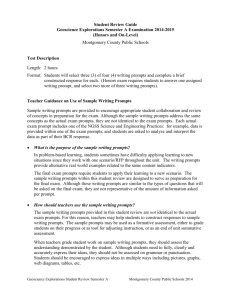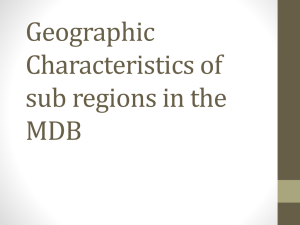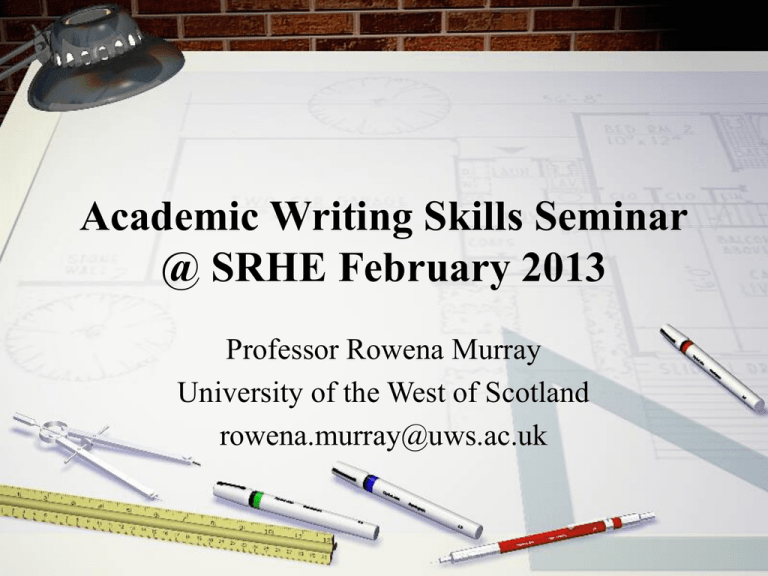
Academic Writing Skills Seminar
@ SRHE February 2013
Professor Rowena Murray
University of the West of Scotland
rowena.murray@uws.ac.uk
Writing to prompts
• What writing for your thesis have you done, and
what would you like to do [in the long, medium
and short term]?
•
•
•
•
5 minutes’ writing
In sentences
Private writing -- no one will read it
To be discussed in pairs/groups
Make your ‘contribution’
explicit
• ‘This research shows/reveals/confirms’
• ‘This is a contribution in the sense that …’
• ‘This is a contribution to the extent that …’
Internalising the debate
•
•
•
•
•
‘Some will argue that …’
‘One interpretation could be …’
‘However, this could be taken as …’
‘This is not to say that …’
‘Possible interpretations include …’
Prompts from journals: 1
‘Using earlier research into models of place
branding-management processes, this paper
develops a multi-level conceptual model of … The
model identifies the following components for …
The model identifies the influences and action
processes … This paper proposes an integrative
model that builds on and subsumes …’.
(Hanna & Rowley, 2011: 458
Journal of Marketing Management)
Prompts from journals: 2
‘I explore the role of trust in acquisitions of
entrepreneurial firms … I outline how … I
also find that buyers’ and sellers’ beliefs …
I explore the implications of these findings
for developing a theory of trust asymmetries
and argue that …’.
(Graebner, 2009: 435
Academy of Management Journal)
Prompts from journals: 3
‘This paper investigates the extent to which
the outcomes of the 2008 Research
Assessment Exercise … can be explained
by … The main finding is that … A further
finding is that …There is also evidence of
bias … The results support the use of …’.
(Taylor, 2011: 202)
British Journal of Management)
Active verbs for discussing ideas
Informs, reviews, argues, states, synthesises,
claims, answers, explains, reconsiders,
provides, maintains, outlines, supports,
compares, lists, acknowledges, confirms,
analyses, disputes, concludes, reveals,
implies, reminds, suggests, considers,
highlights, refutes, assembles, shows, adds,
clarifies, identifies (Ballenger, 2009)
Writing a page-98 paper
• My research question is … (50 words)
• Researchers who have looked at this subject are …
(50 words)
• They argue that … (25 words)
• Debate centres on the issue of … (25 words)
• There is work to be done on … (25 words)
• My research is closest to that of X in that … (50
words)
• My contribution will be … (50 words)
Why a ‘page 98 paper’? And when?
•
•
•
•
•
•
•
Early: to establish direction/focus
Associate & dissociate with literature
Build on research question/hypothesis
Focus reading/thinking
Manageable writing task: 325 words
To develop thinking and/or for thesis?
Late: to focus thinking/intro conclusions
Matching aim and claim
The aims of my study are/were …
My research questions are/were …
My research objectives are/were …
Brown’s 8 questions
1.
2.
3.
4.
5.
6.
7.
8.
Who are intended readers? (3-5 names)
What did you do? (50 words)
Why did you do it? (50 words)
What happened? (50 words)
What do results mean in theory? (50 words)
What do results mean in practice? (50 words)
What is the key benefit for readers (25 words)
What remains unresolved? (no word limit)
Brown’s 8 questions
•
•
•
•
•
•
•
To draft an abstract
Not just for experimental work
Set word limits
Using generic structure
Generating text you can work on later
Write abstract first, revise it as you go
Construct/see the whole argument
Types of prompt
• Warm up prompts: 5 minutes taking stock and goal-setting.
• Generic prompts, e.g. ‘The purpose of this paper is to …
This suggests that …’
• Journal prompts, e.g. …?
• Questions, e.g. ‘What do I want to write?’
• In outlines, i.e. as well as headings.
• Revision prompts, e.g. ‘Define other approaches’.
Summary
•
•
•
•
•
•
•
•
•
Use both formal & informal prompts
Try question & fragment forms of prompt
Use 1st person (i.e. ‘I’ and ‘we’)
Use verbs -- make purpose of your writing explicit
Use prompts to take stock & set new goals
As a warm up for writing
To start writing quickly and easily
To build confidence
To engage with/solve writing problems
References
Murray, R. (2011) How to Write a Thesis, 3rd
edition.
Murray, R. (2009) How to Survive your Viva,
2nd edn.
Murray, R. (2009) Writing for Academic
Journals, 2nd edn.
Maidenhead: Open University PressMcGraw-Hill.
References
• Ballenger, B (2009) The curious researcher:
A guide to writing research papers, 6th edn.
New York: Pearson Longman.
• Murray, R & Moore, S (2006) The
handbook of academic writing: A fresh
approach. Maidenhead: Open University
Press-McGraw-Hill.
Readings
• Morss, K. & Murray, R. (2005) Teaching at
University: A Guide for Postgraduates and
Researchers. London: Sage.
• Gilbert, N. Ed. (2006) From Postgraduate to
Social Scientist: A Guide to Key Skills. London:
Sage. Chapter 9: ‘Writing articles, books and
presentations’ 149-170.

